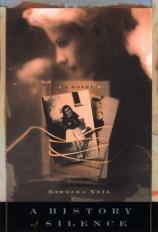Reading Group Guide
Discussion Questions
A History of Silence

1. Why do you think Neil gave us nine "snapshots" of Laura at the outset of the book? How did this help propel you forward in reading the novel?
2. There have been a lot of novels and memoirs in recent times dwelling on the subject of child abuse. Did you find Neil's novel different than A Thousand Acres by Jane Smiley or The Liar's Club by Mary Carr in its handling of the subject? In what way?
3. Neil has a talent for revealing character indirectly, through dialogue and action rather than straightforward narrative description. After Robbie met Raoul, were you surprised by his reaction to her? Did his comments about her behavior have greater impact in revealing how she appeared than a few words by the author or Robbie herself would have?
4. Did the characters of Robbie and Laura seem real? Were you able to identify with them? What did you think of the author's choice of Robbie as the narrator? Why do you think Neil chose her as the narrator rather than Laura? How did Robbie's voice or personality affect the telling of the story? Did she have a special perspective that made you care more about the story?
5. Once Robbie reached Janvier, the novel changed in style and pace. How did the interaction between Robbie and Raoul generate tension and suspense and create a new movement forward in the novel?
6. The secondary characters in Neil's novel each have very distinct personas. Can you find examples in the dialogue of varying styles of speech that tip you off to the different personalities and backgrounds of the speakers?
7. Neil creates two distinct locales for her story: London and Louisiana bayou country. How did the flavor of these two different locations relate to the events in the story? Was Neil successful in making these places come to life?
8. Children play an important role in A History of Silence. Did you observe any changes in Robbie's behavior toward Will as the tale unfolded? Toward children in general? What did that tell you about her emotional well-being? Was it believable that Laura could raise a son who seemed so well-adjusted?
9. So much is left unsaid between characters in Neil's novel-not just between Laura and Robbie and Esther, but between other characters as well, even the most loving. Can you think of examples? In all cases was it destructive to leave certain things unsaid? Did you blame Patrick for not trying to discuss Laura's problems at a greater length?
10. In a novel involving a Southern plantation, the portrayal of African-Americans can be a very sensitive issue. How did you react to the characterization of black people in the story? Did the Bizets and Alice Wine come off as individuals, or did they seem stereotypic? Did Raoul's relationships with Charles and Alice seem humane and authentic?
11. What did you think of the way Neil handled the relationship between Esther and her daughters? Were you surprised at the end by Esther's remarks about her girls' experience in their father's house? Did this kind of response seem real to you? Did you understand why she said it?
12. What did you think about Neil's choice of Laura's fate? Was this an ending you could accept? There was some ambiguity as far as Robbie's future. How do you envision the story continuing for her? What were the clues that lead you to make this conclusion? Do you think it is more effective when an author leaves some questions to be answered by the reader, or do you like stories neatly wrapped at the end of a book?
A History of Silence
- Publication Date: September 15, 1998
- Paperback: 352 pages
- Publisher: Nan A. Talese
- ISBN-10: 0385491786
- ISBN-13: 9780385491785






